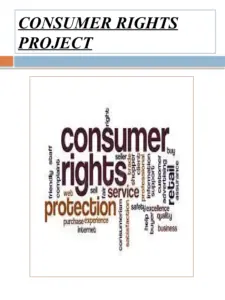This document Consumer Rights delves into the fundamental rights and responsibilities of consumers, emphasizing the importance of consumer awareness and protection. Explore key topics such as the definition of a consumer, the difference between a customer and a consumer, and the six crucial consumer rights outlined by the Indian government. Discover the significance of rights such as safety, information, choice, being heard, redress, and consumer education. Uncover how these rights empower consumers to make informed choices, seek redressal, and ensure their safety in the marketplace. Elevate your understanding of consumer rights with this insightful project.















